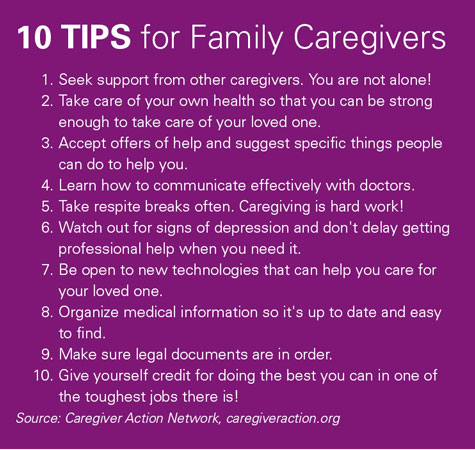Caregiver burnout is a state of physical, emotional and mental exhaustion that may be accompanied by a change in attitude.
If you haven’t yet encountered a colleague, friend or family member who is caregiving for an older or disabled loved one, there is no doubt you will eventually. According to the Family Caregiver Alliance, approximately 40 million Americans are currently in this situation, and the number continues to grow. Here are some signs that someone in your circle is struggling—and what you can do about it.
Signs of Caregiver Burnout in Coworkers
Running late. Jane is a middle-school principal taking care of her husband, who recently had a stroke. She was always very punctual, but now shows up late on a regular basis—even when there is an important meeting.
Moodiness. Steve, a restaurant manager, has always had a great sense of humor, and his employees have always respected his firm, yet light-hearted management style. But ever since he had to move his brother with multiple sclerosis into his home, Steve has been short-tempered at work, and staff has grown uncomfortable working with him. Gone are the days of having fun while working, as Steve’s employees never know if he’s going to fly off the handle or be impolite to a customer.
But while Steve is short-tempered, other employees struggling with caregiver burnout may be experiencing sadness. For example, the usually upbeat Jody, a publicist, has been caught in the employee restroom tearing up when she’s been on her cellphone. Colleagues suspect it’s because she’s dealing with her father-in-law, who has dementia.
Making more mistakes than usual. Jay, a very bright bank teller, has been making more mistakes at work since his aunt came to live with him. He has forgotten the names of several regular customers and made a number of simple math errors, causing his manager to become concerned.
Talking about quitting or going part-time. Working caregivers experiencing caregiver burnout typically consider quitting or reducing hours for a while before they actually do it. Colleagues taking care of older or disabled loved ones who broach this topic with a peer or manager are typically very serious. Many working caregivers don’t see the point in continuing to work—particularly if they are close to retirement age or are not primary breadwinners. Some working caregivers are also paying a lot of money toward paid caregivers or assisted living. They may think quitting or reducing hours in order to provide care to their loved one makes more sense than remaining in the workforce.
Coming to work sick. While those struggling with caregiver burnout are susceptible to more illnesses, they will often come to work anyway because they are saving sick and vacation days for when they need to handle issues with their older or disabled loved one.
How Do You Respond?
Encourage working caregivers to communicate with their manager and/or human resources department to seek creative solutions. While the working caregiver should probably not share every painstaking detail, it is important that the employer knows there is a caregiving situation, as well as some details about what that involves for the employee.
Often, working caregivers are reluctant to share their caregiving challenges, much the way some working mothers are reluctant to discuss childcare issues because they don’t want the employer to doubt their commitment to the job. In reality, however, many employers are willing to make special arrangements to support and retain valued employees facing such circumstances.
Programs and regulations like the Family Medical Leave Act (FMLA) and Employee Assistance Programs (EAP), as well as alternative work schedules, might offer the working caregiver the helping hand he or she so desperately needs. But many employees are not aware that such programs exist.
 Signs of Caregiver Burnout in Friends and Family
Signs of Caregiver Burnout in Friends and Family
Trying to do it all themselves. Your friend Jessica has been spending every night sleeping on her mother’s couch since her mom recently had major surgery. Despite other siblings in the area, you notice that Jessica is the only family member involved in care.
Change in appearance. Everyone has always envied your friend Denise for her perfectly coifed hairstyles, well-manicured nails and desirable figure. But since she started taking care of her grandfather who has cancer, she has lost a lot of weight and doesn’t seem to pay the same attention to the way she dresses or grooms.
They never talk about anything fun. Friends and family struggling with caregiver burnout generally discuss only what they “have to do.” This involves caregiving duties, work responsibilities and perhaps taking care of their kids. There is no mention of vacation, meeting friends, a great movie they’ve seen or a fun event they are looking forward to.
How Do You Respond?
Offer your help—offer it again and again. Typically a family or friend in throes of caregiver burnout will refuse help the first few times it is offered. Their mindset may be that they don’t want to “bother” anyone or they don’t want to have to “train” someone how to provide care. If that is the case, start suggesting small ways you can help. Here are some conversation starters that might get the ball rolling:
“I’m going to the grocery store. What can I pick up for you?”
“I just hired a kid to shovel my walkway. I was going to just have him do yours too—is that okay?”
“I’d love to watch the game with your father-in-law while you catch up on your paperwork. Would it be all right if I stop by on Sunday?” iBi
Jennifer L. Fitzpatrick, MSW, CSP is a speaker, gerontology instructor at Johns Hopkins University and author of Cruising Through Caregiving: Reducing The Stress of Caring For Your Loved One. To download a free chapter, visit cruisingthroughcaregiving.com.


